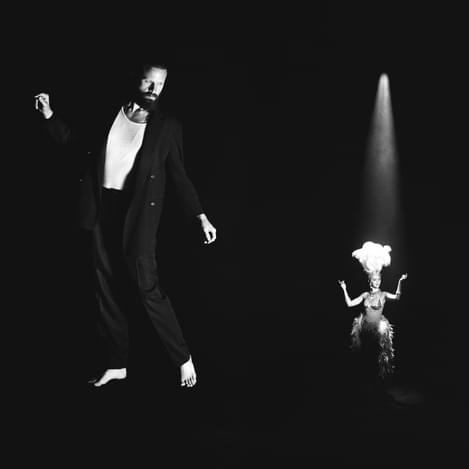Father John Misty’s surrealist concept album barely leaves an impression
"Chloë & The Next 20th Century"

Like most of those now-historic conversations, that all feels pretty dumb now. Father John Misty made four great albums, filled with songs filled with the kind of lyricism which filled most of his peers with envy, and sung in an angelic voice.
After a four year break, there is now a more relevant question when it come’s to Tillman’s music: do you like Harry Nilsson? More specifically, do you like Harry Nilsson’s album A Little Touch of Schmilsson in the Night? Bizarrely, that 1973 record of covers seems to be a near singular influence on this record. Tillman’s songs are originals but they stick so closely to formulas of old that, sometimes, it’s hard to tell. They can be pretty, from the gentle guitar of "Goodbye Mr. Blue" to the baroque upswell of "Q4", but this is a record for nighttime, in-ear listening, so sleepy that sometimes it’s straight up narcoleptic.
Perhaps his detractors made it happen. For years Tillman’s lyrics were deemed to be too pointed, too direct. Well, no more. Here they’ve become vague to distraction. There is a vague narrative, something to do with the narrator’s lover Chloë, who commits suicide at the end of the opening track. But for an album which so clearly sells itself as a capital C concept Album, the narrative is indecipherable; each track dropping a handful of new character names, and the final song seems to give up on it completely.
Tillman is a fantastic songwriter, and so some of the new material is gold regardless. "Buddy’s Rendezvous" is a slow-burning exercise in rising tension which builds towards an ecstatic climax without ever losing its romantic blush. "Funny Girl" is coloured by some of that old delicious oddity, with Tillman singing "your schedule's pretty crazy, doing interviews for the new live action Kathy”. Epic closer "We Could Be Strangers" feels like vintage FJM, crooning captivating poetry over a taunt instrumental which breaks into a dramatic, spaghetti-western guitar solo at the mid-point.
The album also hints perpetually towards surrealism, with bizarre, art deco packaging and a collaboration with David Lynch on the deluxe edition. In fact the country strings on "Only A Fool" or the cruise ship-flamenco of "Olvidado (Otro Momento)" are so cheesy that you can only assume that they must be part of a kitsch, Twin Peaks-nightmare, but it’s another road to nowhere. If Tillman is going for something of that world then he’s undercooked it to such an extent that the songs end up sounding simply like replicas of what they’re pastiching.
The worst offender is the title track, which features regrettably jaunty piano and an actual trumpet solo, over which Tillman awkwardly sings in the style of a '50s jazz crooner without a hint of irony – the whole thing inevitably sounding like a poor South Park skit. That being said, perhaps even that is preferable to "We Could Be Strangers", a song I’ve heard a couple of dozen times and still cannot even slightly recall, perhaps because it’s sung is the same lilting tone which Tillman, who used to howl on records, delivers all of these songs in. This is a man who once sung about the collapse of western civilisation, covered Taylor Swift in the style of The Velvet Underground and ended his shows with Nine Inch Nails’ "Closer". Love or loathe him, boring was never in his repertoire then.
Get the Best Fit take on the week in music direct to your inbox every Friday

Tunde Adebimpe
Thee Black Boltz

Julien Baker & TORRES
Send A Prayer My Way

Bon Iver
SABLE, fABLE





